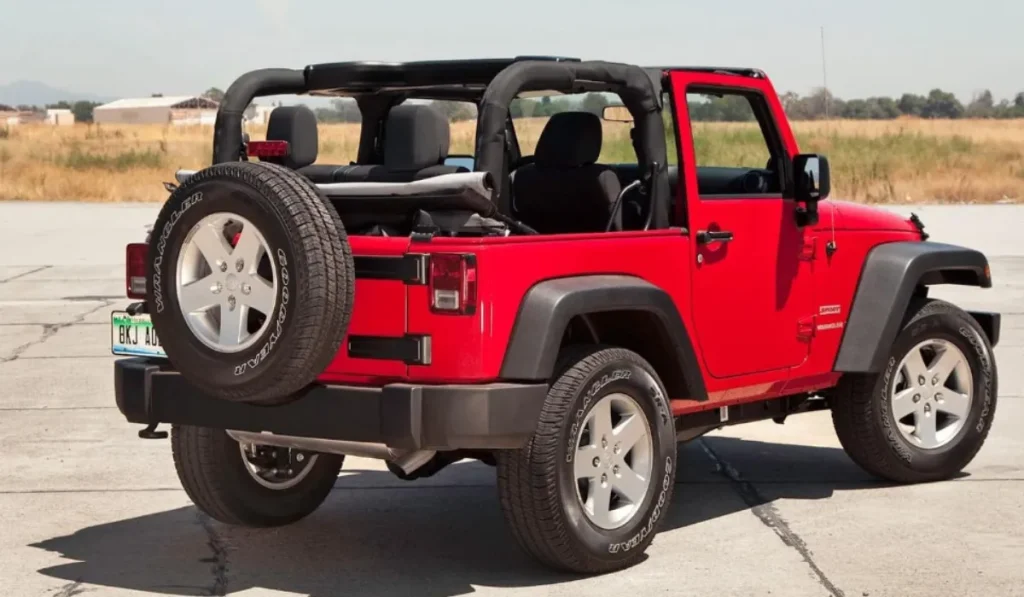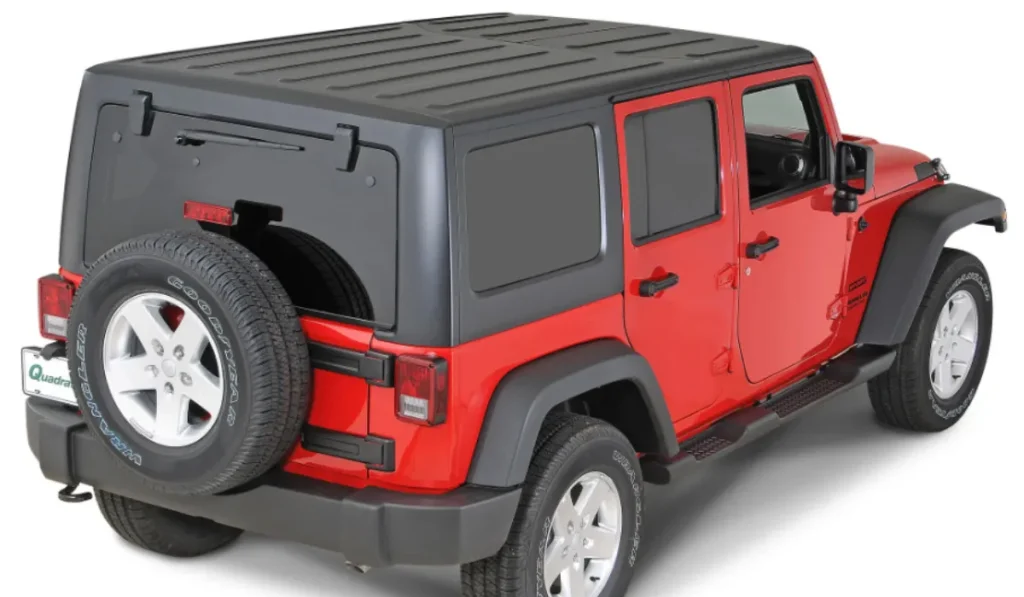A Jeep hard top typically weighs between 140 and 220 pounds. The specific weight depends on the model and year of the Jeep.
Jeep enthusiasts often ponder the weight of their vehicle’s hard top, especially when considering removal or customization options.
Understanding this aspect is essential for owners who might need to handle the hard top themselves. A lighter hard top facilitates easier removal and installation, which is a common task when transitioning from a closed vehicle to an open-air experience.
Safe handling ensures that both the vehicle and the owner avoid damage and injury, and precise knowledge of the hard top weight can influence storage solutions or the need for assistance.
Emphasizing the importance of this information, owners should consult their owner’s manual or contact the manufacturer for the exact weight of their specific model’s hard top.
Jeep Hard Tops: A Weighty Consideration
Understanding the heft of Jeep hard tops is vital for performance and utility.
Let’s delve into the intricacies of hard top weight and its impact on your Jeep’s behavior on and off the road.
Importance Of Weight In Vehicle Performance
Each component of a Jeep, including the hard top, influences performance. Heavy tops can affect:
- Fuel Efficiency – More weight demands more fuel.
- Handling – Weight distribution alters maneuverability.
- Braking – Heavier loads require longer stopping distances.
- Suspension Stress – Additional weight increases wear on suspension components.
A typical Jeep hard top might weigh between 140-220 pounds, depending on the model.
Variations In Jeep Models And Corresponding Tops
Various Jeep models sport diverse hard tops. Each has unique features and weights.
| Jeep Model | Hard Top Type | Weight (Approx.) |
|---|---|---|
| Wrangler JK 2-door | Standard Hard Top | 140 lbs |
| Wrangler JK 4-door | Freedom Top | 220 lbs |
| Wrangler JL 2-door | Standard Hard Top | 145 lbs |
| Wrangler JL 4-door | Freedom Top | 218 lbs |
| Gladiator JT | Standard Hard Top | 140 lbs |
Notice that 4-door models generally come with heavier hard tops. This owes to their extended roof coverage.
The Freedom Top for 4-door variants splits into smaller sections for easier removal and storage.
Breaking Down The Numbers

Jeep enthusiasts often ask about the specifics of their vehicles, especially when planning modifications or upgrades.
One of the most common questions is, “How much does a Jeep hard top weigh?” Understanding the weight is essential as it affects handling, fuel efficiency, and compatibility with your garage setup.
Let’s dive into the details and break down the numbers for some of the most popular Jeep models.
Average Weights For Popular Jeep Hard Tops
Jeep hard tops come in various styles, but they typically share a range in weight depending on the model. Here is a look at the average weights:
| Jeep Model | Hard Top Weight |
|---|---|
| Jeep Wrangler JK 2-door | 120 lbs |
| Jeep Wrangler JK 4-door | 140 lbs |
| Jeep Wrangler JL 2-door | 115 lbs |
| Jeep Wrangler JL 4-door | 135 lbs |
| Jeep Gladiator | 140 lbs |
These are average weights and can vary based on features like additional insulation or roof racks.
Comparing Hard Top Weight To Soft Tops
When debating between hard and soft tops, weight is a crucial factor. While soft tops are typically lighter and easier to remove, hard tops offer increased security and insulation. The contrast in weight can be quite significant:
- Soft tops may weigh as little as 50-75 lbs, making them substantially lighter than hard tops.
- Hard tops provide a sturdy, durable solution but their weight means handling them can require more than one person.
Choosing between the two involves considering lifestyle, usage, and whether you’ll frequently remove the top.
Construction Materials And Weight Impact

Choosing the right Jeep hard top is crucial for both protection and performance. The weight of a Jeep hard top can influence fuel economy and handling. It all starts with the materials used during manufacturing.
Let’s dive into how these materials can impact the overall weight and durability of a Jeep hard top.
Materials Used In Jeep Hard Top Manufacturing
Jeep hard tops are not all made the same. Various materials come into play:
- Fiberglass: Common and sturdy
- Thermoplastic: Lightweight and resilient
- Aluminum: Offers strength with less weight
- Steel reinforcements: For added security
- Polyurethane insulation: For temperature control
These materials are carefully selected to balance weight and toughness.
How Material Choices Affect Weight And Durability?
Every material impacts the hard top in unique ways:
| Material | Weight Impact | Durability |
|---|---|---|
| Fiberglass | Heavier | High durability |
| Thermoplastic | Lighter | Good impact resistance |
| Aluminum | Light but strong | Excellent durability |
| Steel | Adds weight | Superior strength |
| Polyurethane | Minimal impact | Enhances insulation |
Selecting a hard top involves considering the trade-offs between these factors. The ideal material combination ensures a robust yet manageable hard top for your Jeep.
Handling And Installation Implications
Handling and installing a Jeep hard top is no small feat. The weight of the hardtop is a crucial factor that impacts all aspects of its removal and storage. Efficient handling ensures longevity and safety.
Let’s dive into how weight plays a role in this scenario and explore some of the tools and techniques that ease the process.
How Weight Influences Removal And Storage?
The weight of a Jeep hard top can vary, often ranging between 100-150 pounds. Its substantial weight demands a methodical approach to removal and storage.
- Heavier tops require more people or specialized equipment for lifting.
- Utilize a designated storage area to prevent damage.
- Heavy-duty wall hangers can support the weight when not in use.
Lifting without the right techniques or tools can lead to damage or injury. Plan to handle the hard top with care.
Tools And Techniques For Safe Hard Top Handling
Removing and installing a hard top safely calls for specific tools and strategies.
| Tool | Function | Benefit |
|---|---|---|
| Hoist System | Lifts and holds the hard top | Reduces physical strain |
| Hard Top Cart | Transports and stores the top | Prevents scratches and dents |
| Straps and Harnesses | Secure the hard top during lifting | Increases safety and stability |
- Read the manual for proper removal instructions.
- Enlist a friend or use mechanical assistance for lifting.
- Secure the hard top with straps to a hoist or cart.
Remember, safety is paramount. Use the right tools to prevent accidents and ease the process.
Weight And Jeep Performance
When considering modifications for your Jeep, the hard top’s weight plays a pivotal role. While sturdy and offering better protection and comfort, a heavy hard top can affect both fuel efficiency and handling dynamics.
Understanding these impacts helps Jeep owners make informed decisions.
The Effects Of Hard Top Weight On Fuel Efficiency
Every extra pound matters when it comes to fuel efficiency. Jeeps sporting heavier hard tops require more power for movement, leading to increased fuel consumption. This translates to frequent stops at the gas station and higher expenses over time.
- Increased Drag: Heavier tops can alter aerodynamics, causing drag.
- Added Weight: More weight from the hard top means the engine works harder.
- Reduced Mileage: The harder the engine works, the lower the mileage per gallon.
Handling Dynamics With A Heavy Rooftop
A heavier hard top shifts a Jeep’s center of gravity upwards. This change impacts handling and stability, especially during off-road adventures or sharp turns. It’s crucial to understand how a weightier roof can alter your driving experience.
| Jeep Model | Hard Top Weight (approx.) | Impact on Handling |
|---|---|---|
| Wrangler JK | 140 lbs | Noticeable |
| Wrangler JL | 140 lbs | Noticeable |
| Gladiator JT | 220 lbs | Significant |
Jeep engineers work tirelessly to balance durability and performance. Still, opting for a lighter aftermarket hard top could be a strategic move for those who value agility and fuel economy.
By considering these factors, Jeep enthusiasts can enhance their vehicle’s performance without sacrificing essential attributes like safety and comfort.
Upgrades And Customizations
Jeep enthusiasts love personalizing their rides. The heavy stock hard top can dampen the spirit of adventure.
Upgrades to a lighter hard top offer relief. They are perfect for those seeking performance without compromising durability. Let’s delve into your options to shed weight from the top of your Jeep.
Lightweight Aftermarket Options
A range of aftermarket options exists for lighter hard tops. Manufacturers understand the need for balance between weight and protection. They use advanced materials like fiberglass or carbon fiber.
These options reduce the Jeep’s center of gravity. This improves handling and fuel efficiency. Several popular lightweight options include:
- Fiberglass tops: A durable but lighter alternative to factory models.
- Carbon fiber tops: Offer the best in lightweight and strength.
- Aluminum tops: Known for their rust resistance and reduced weight.
Enhancing Performance With Lighter Tops
Lighter tops bring more than just a reduction in weight. They enhance the Jeep’s performance in various ways. Off-roaders find improved agility and decreased wear on suspension components.
Those with lighter tops enjoy better fuel efficiency and less strain on the engine. Highlights include:
- Agility improvements allow for sharper turns and better off-road handling.
- Decreased stress on the suspension means longer lifespan for your Jeep’s components.
- Less weight allows for a modest boost in fuel economy.
- Enhanced aesthetics with a sleek top can turn heads.
| Hard Top Material | Weight Reduction | Durability |
|---|---|---|
| Fiberglass | Medium | High |
| Carbon Fiber | High | Very High |
| Aluminum | Low | Medium |
FAQs About the Weight of A Jeep Hard Top
What Is The Weight Of A Standard Jeep Hardtop?
A standard Jeep hardtop typically weighs between 100-150 pounds. It’s designed to be manageable for two people to remove and install.
Can One Person Remove A Jeep Hardtop?
Removing a Jeep hardtop is possible for one person with special hoists and stands. However, it’s generally recommended to have two people for safety and ease.
Does A Jeep’s Model Affect Hardtop Weight?
Yes, the Jeep model affects the hardtop’s weight. Larger models like the Wrangler Unlimited have heavier tops compared to smaller models.
How Does A Hardtop’s Weight Impact Fuel Efficiency?
A heavier hardtop can slightly reduce fuel efficiency due to the added weight. However, this impact is minimal and often considered negligible by owners.
Conclusion
Understanding the weight of a Jeep hard top is essential for safe handling and vehicle performance optimization. Ranging from about 140 to 220 pounds, it affects fuel efficiency and dynamics. Remember, always seek help or proper equipment when removing or installing your hard top.
Drive safe and enjoy the versatility of your Jeep!
Resources:
https://www.quadratec.com/c/reference/what-are-differences-between-soft-top-hardtop
